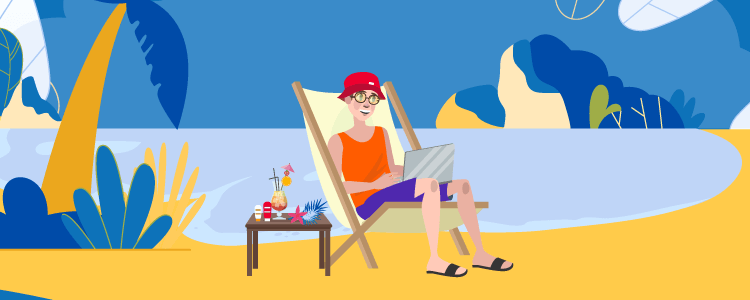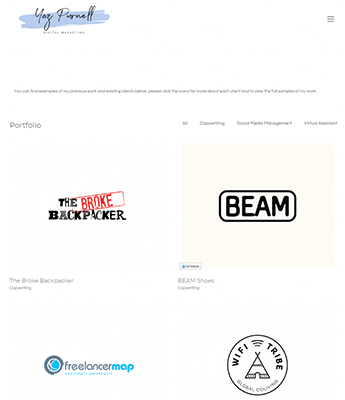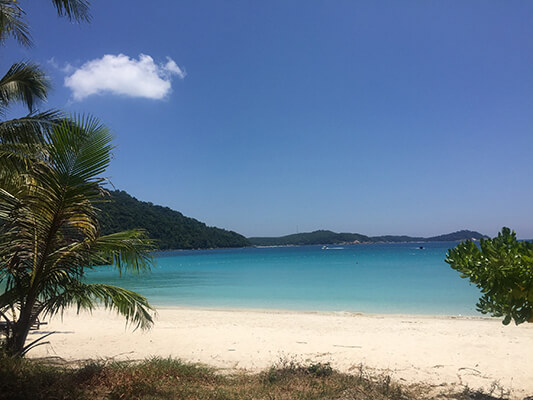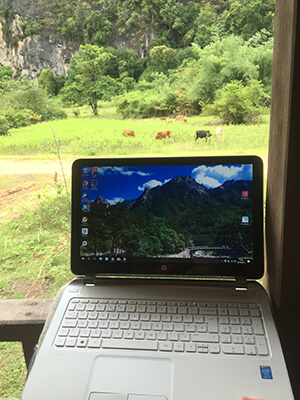How To Build A Sustainable Freelance Writing Business While Traveling The World

These days, if I told you that it really is possible to get your dream job and use it to fund a never-ending adventure around the world, would you believe me?
In the past, the idea of the ‘digital nomad’ lifestyle – having a location independent job that allows you to travel the world as you please – was a dream for most people.
Now, however, it’s far more common than you think.
More and more people are waking up to the fact that a traditional 9 – 5 office job is an archaic structure, with employers and employees alike leaning towards flexible working to boost morale, loyalty, and productivity (yep – people are at their most productive when they’re happy, who knew!).
A few years ago, I was one of those people sick to death of the office grind.
I would come home feeling unchallenged and unsatisfied every day, and question how I had fallen into this trap of living to work already.
I wanted the freedom to set my own work hours, choose my clients, my income, and to have the time I wanted to do the things I really love.
So, I built a freelance writing business, quit my job, and started traveling the world.
Being a digital nomad isn’t a pipeline dream anymore – I’m 100% confident that it’s possible for anyone with the right attitude and motivation.
My journey from office worker to location independent freelancer wasn’t easy, and I’ll never be one of those cheesy people that tells you ‘I can make your dreams come true’.
I didn’t change my life in a matter of weeks: in fact, it took months of long days and hard work, and even longer to take my business from working to thriving.
That being said, there are clear, actionable steps you can take to make building a freelance business of your own a reality in time.
Below are some of my best tips for building your own freelance business – and making it sustainable enough that you can travel the world, no return flight needed.
1. Build your business foundations before you start traveling
The notion of dramatically quitting your job and hopping on a flight to the other side of the world may sound romantic, but it’s not the best way to build a sustainable location independent business.
Getting your freelance business to the point where it can replace a full-time income and fund whatever lifestyle you want does take time, so don’t rush into this and take any risks (i.e. quit your job) before you can afford to.
I worked on my freelance writing business for about 4 months before I felt confident enough to hand my notice in for my office job. In that time, I focused on:
- Setting up a professional website for my business
- Building my portfolio by blogging (see the next point!)
- Networking on social media with other freelancers
- Acquiring clients (and experience) where possible, and turning them into long-term contracts.
It was only when I had a few long-term clients that made me more than half my income from my office job that I decided to leave my job and start traveling.
If you’re stuck, be sure to check out this list of the best freelancing job websites.
2. It’s all about your portfolio
Too many people focus on finding jobs and making their professional website great, when in fact, you should be focusing a large percentage of your efforts on creating a strong portfolio in the early days.

I have my own website to display my portfolio, but I also have a PDF with private clients that I send to potential clients too.
Your portfolio should contain the best examples of your writing, ideally having been published online by legitimate businesses and bloggers. Of course, the ultimate paradox is that you need jobs to build your portfolio, but you need a portfolio to get those jobs.
Thankfully, there are many ways to get around building your portfolio as a new freelance writer (traveler or not!).
These include:
- Start blogging – You could write about your travels, or about something else entirely. When I launched my freelance business, I also started my first blog at the same time. This not only gave me a great platform to showcase my writing – but it actually brought clients directly to me!
- Do work for free – My second best tactic for building my portfolio was to offer free content to my friends and family who owned their own business. This ranged from updating the copy on their website to writing a few great quality blog posts for them.
- Guest posting – If you don’t want a blog of your own, guest posting for established blogs can be an effective way of building your portfolio. You should note, however, that most blogs are increasingly only accepting posts from other bloggers.
3. Manage your expectations
I’m willing to bet almost everyone has this vague idea of being a digital nomad in their head:
You’re at the beach, probably on a hammock or a sun-lounger, laptop on your lap and a cocktail in one hand. You’re soaking up the sun while you do a few hours work before heading back to your beach house and getting ready for a night on the town with your friends.
So, okay, that may be an exaggerated stereotype of a digital nomad, but it’s an image that has wrongly been portrayed to all of us by blogs and social media.

The truth is, the digital nomad lifestyle is awesome – but it is not all glamour. You’ll get views like that sometimes, sure, but it’s important to manage your expectations.
Some days you’ll be stuck in your hotel room all day because there’s nowhere else with good WiFi. Sometimes, you’ll have the worst WiFi connection you’ve ever experienced, and you’ll be frantically running around town trying to meet your deadline.
Sometimes, you’ll go for days without meeting anyone that you connect with, and that can get incredibly lonely.
And if you ever take your laptop to the beach – that will be the last time, because expensive gadgets and sand simply do not mix.
None of this is said to put you off: I love the life I have now.
However, it is important to manage your expectations and to know that for every great day of freedom you’ll have, there will be another nightmare situation where you wish you were in at a comfy desk with a secure internet connection for once.
4. Ethics and cost arbitrage
Turning to the digital nomad lifestyle is actually a great move when you’re just starting out as a freelance writer.
Why? Well, if you start your freelance business from home, the chances are you live in a country with a relatively high cost of living, with things like a mortgage or rent, bills, and other expenses that you need to be able to pay off.
This means that you may need to work long hours juggling your full-time job and freelance business for longer until you can comfortably replace your income.
Travelling, however, gives you the opportunity to live in countries with a lower cost of living and therefore takes the pressure of matching your regular salary off.
For example, when I started traveling, my monthly income was half that of my income from my office job – but because I traveled in South East Asia, my income still more than covered my living costs.
This kind of cost arbitrage is extremely popular with digital nomads and is an effective way to live with a lower income while you focus on building your business up.
However, you should also be mindful of the ethical impact living like this can have on the country you are staying in.
To ensure I was also benefiting the countries I traveled through and not just myself, I did things like:
- Shop and eat at local restaurants to support the community
- Avoid large chain hotels and stay at guesthouses and independent hostels
- Recognise your privilege – you are extremely lucky if you are in a position to visit a foreign country at all, let alone stay in it a longer period of time. Recognise this privilege and accept that you may have to pay more as a foreigner in some places.
5. Know where you’re going
As someone who has been both a backpacker and a location independent freelancer, I can safely say that there are huge differences (not just an age gap!) in the two styles of traveling.
Backpacking can be as spontaneous as you want with real worries about where you’re heading next. Working on the road, however, requires a little more planning and preparation.
Ideally, you want every place you visit to have at least:
- A good WiFi connection
- One or two spaces to work (especially if you’ll be staying in loud dorm rooms!)

The above photo taken in Thakhek, Laos, is a key example of this – while it may look pretty sweet to be surrounded by mountains and cows grazing just a few meters away, I actually had to hike out to this little hut every day to get a WiFi connection at all!
To research this before you decide, search online. I always google ‘destination + digital nomad reviews’ or, failing that, read travel blogs about the destination I’m thinking of heading to.
These will normally give you a good idea of where you’re heading, and whether each potential destination is ideal for digital nomads.
Just remember that not every place is going to have killer WiFi and an abundance of cafes to work out of – but if you at least do some research beforehand, you can prepare for those places that may be a little more tricky to work around.
6. Making use of the location independent lifestyle to grow your business
A great advantage of the location independent style is that you will meet so many more people than you would sitting back in your home office.
When I first started traveling, I would always find myself in conversations with people so interested in freelancing, how I built my business, and what type of work I did.
No doubt, you’ll find yourself in similar conversations too. Make use of this curiosity to network and make contacts with people you meet along the road.
Does the friendly hostel owner you got speaking to need some help with their website? How about the self-employed business owner who is also location independent, but definitely not a natural writer?
As a digital nomad, you have the unique opportunity to meet people all over the world – and amongst these people is always the opportunity to bring on some great long-term clients.
7. Keeping your clients happy
So, you’ve been traveling for a while and you’ve successfully taken on a few long-term clients. Everything’s looking good – so the main thing you should be concerned about is keeping things looking good.
The last thing you want is for your time zone or travel plans to come into conflict with an agreed contract you have with a client.
Here’s how I look at it: your client is paying you, so you need to bend to their needs. That may mean staying up all night so you can take a meeting in their deadline – but then again, you’re the one that gets to explore the world, so it’s worth the sacrifice!
I found making virtual tools a part of my daily routine invaluable for keeping my clients happy while traveling. A few of my top recommendations include:
- Trello – A fantastic project management tool with both free and paid subscription options. You can share boards with your clients so if they need an update on a project, or want to add a task for you to do, they can simply add it to the board for when you next login rather than have to contact you directly.
- Slack – Slack is a great instant messaging service that is particularly useful if you are working within a remote team. You can send a message that will then be saved on the chat until your team members log in and see.
- Google Hangouts – This is a great tool for holding virtual meetings and sharing screens with your client or colleagues when you need to discuss a project in more depth.
- Google Drive – A priceless tool for a freelance writer! Google Docs save automatically as you write, so you never have to fear your laptop suddenly dying and taking all your unsaved articles with it! It is also great as has cloud-based storage so can be accessed from any device, and easily shared between clients.
Over to you
Hopefully, your answer to my question at the start of this article is yes.
Building your dream business and making it sustainable enough to travel the world long-term sounds like a pipe-dream, but you simply need the time and discipline to lay the foundations, be consistent, and slowly level up your freelance business.
Two years ago, if you told me I’d be self-employed, running a business I love with the freedom to live anywhere in the world, I would have laughed in your face.
Now, I wake up every day excited to jump into a new adventure. So if you crave the freedom of working on the road – what are you waiting for?

